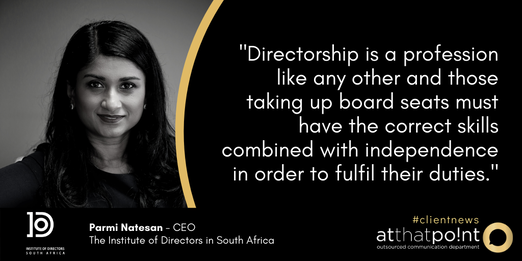|
The recent testimony at the Zondo Commission by Dudu Myeni (former Chair of the SAA Board) and Yakhe Kwinana (former Chair of SAA Technical) should be a wake-up call both for directors and the government, says Parmi Natesan, CEO of the Institute of Directors in South Africa (IoDSA). “Directorship is profession like any other and those taking up board seats must have the correct skills combined with independence in order to fulfil their duties,” she says. These fundamentals are:
Duties. The primary duty of directors is to act in the best interests of the company in good faith. In addition, they must act with care, diligence and skill. They are required to understand what skills they need and to acquire them if they are lacking. “This is non-negotiable—one simply cannot serve as a director if one doesn’t understand what the basic fiduciary duty is, and what skills are required,” she argues. “Board members also need other technical competencies that they should acquire.” Advocate Fay Mukaddam, Chartered Director and Technical Advisor, IoDSA adds: “Based on board evaluations the IoDSA does, it’s clear that many board members haven’t even read the applicable legislation and/ or regulations, or even King IV,” she says. “Having a degree, great technical competence or having filled a senior management role does not necessarily make you a good director.” Conflicts of interest. Because the conflict of interest is poorly understood, it could not be applied appropriately. For example, it appears to be believed that if an individual declares a conflict of interest, she can simply continue to participate in the matter. The truth of it is that if one has a material interest in a matter, one cannot be objective and must therefore recuse oneself. Personal risk to the board member. As noted above, board members must execute their duties fully by acting in the best interests of the company with all due diligence, skill and care. If they do not, they expose themselves to enormous risk. They can be held personally liable for decisions taken without due care, and can suffer irreparable reputational damage—or be barred from acting as a director, as has happened to Ms Myeni, who was declared a delinquent director by the High Court earlier this year. “Directors should understand how deep this end of the pool is before they accept an appointment,” Advocate Mukaddam says. The solutions to this dire state of affairs are clear. Government must perform due diligence on board appointments to ensure the right combination of skills, knowledge and experience, as well as the ability to exercise independent judgement. Directors should be obligated to belong to a professional body like the IoDSA which can hold members to a code of conduct, and should obtain the professional certifications to act as a director. The Chartered Director (SA) and Certified Director designations certify that an individual has a certain level of skills based on a competency framework and, most importantly, is required to keep those skills current via continuous professional development. “How much more needs to go wrong before government changes its thinking?” Ms Natesan asks. ENDS MEDIA CONTACT: Stephné du Toit, 084 587 9933, [email protected], www.atthatpoint.co.za For more information on the IoDSA please visit: Website: www.iodsa.co.za Twitter: @The_IoDSA LinkedIn: Institute of Directors in South Africa Company Page
0 Comments
|
Archives
July 2024
Categories
All
|


 RSS Feed
RSS Feed